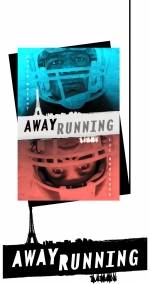Loosely based around actual events, Away Running follows two young men as they play American football in suburban France. This concept may sound strange, but there really are youth football teams overseas as the authors can attest. Yet football only serves as a unifying plot element for a story about race, ethnicity, discrimination, and xenophobia. Away Running is a different young adult novel in that it uses an actual historical event to frame its narrative about growing up and finding one’s place in the wider world. It also helps that the authors actually met while playing football overseas when they were younger.
 Written by current local guy David Wright and co-author Luc Bouchard, Away Running uses a dual perspective format to tell its story. The reader is first introduced to Matthieu “Matt” Dumas, a young, white quarterback from Montreal, Canada. Rather than stand up to his mother and her life plan in business for him, Matt chooses to take his college savings and abscond to France to play football for the Diables Rouges. Once in Paris he contacts his friend Moussa “Moose” Oussekine to say that he’s interested in playing for the underdog team. Matt’s spontaneous decision results in a chance encounter with a young African-American nicknamed Free.
Written by current local guy David Wright and co-author Luc Bouchard, Away Running uses a dual perspective format to tell its story. The reader is first introduced to Matthieu “Matt” Dumas, a young, white quarterback from Montreal, Canada. Rather than stand up to his mother and her life plan in business for him, Matt chooses to take his college savings and abscond to France to play football for the Diables Rouges. Once in Paris he contacts his friend Moussa “Moose” Oussekine to say that he’s interested in playing for the underdog team. Matt’s spontaneous decision results in a chance encounter with a young African-American nicknamed Free.
Hailing from San Antonio, Texas, Free is actually short for Freeman Omonwole Behanzin. Free is on a class trip to France when, feeling out of place among his classmates, he seeks out the American football scrimmage game in Villeneuve-La-Grande, a fictional French suburb. Readers learn about how Free is still dealing with his father’s death from an IED in Afghanistan shortly after accepting a scholarship to play defensive back at Iowa State University. Free watches the Diables play until Matt introduces himself. Obviously, Free’s background is very different from Matt’s, which helps the book to approach events from a different angle. What one reader may find familiar from one perspective, another can find similarity or insight in the other perspective. Having both, Away Running is able to tackle racial and ethnic issues.
Throughout the book, Matt and Free encounter discriminatory events on and off the turf. For example, Matt doesn’t understand at first why the landlady won’t let Moose and Yazid, two Arab-looking young friends, into his cousin’s building. To a more mature reader, the xenophobic situation is apparent and, sadly, a little too familiar. Later, Matt is shocked by his own reaction of fear and uncertainty upon meeting the mostly North African and Arabian immigrant teammates at the Diables Rouges clubhouse. He takes a moment to analyze his feelings and thoughts, but he doesn’t let them stand in the way of his meeting his teammates.
In a different vein, Free has his own moment of racial insecurity. During the first game, Free takes a shot at an opposing team player and pops (hits) him hard. In the heat of the moment, he calls the downed player a derogatory term in English. Quickly, Matt intercedes because he heard and understands English (while everyone else speaks mostly French), but the moment shows a deep well of hurt in the young Texan over his father’s death. As the story progresses, Matt and Free work together to build up their team’s skills and esteem while they help each other grow and learn as well.
 Yet the racial tension builds and culminates in one larger event of discrimination that both have difficulty handling. Towards the end of the book, the story picks up where the first chapter left off with Matt and Free in handcuffs with the police. Their friends and teammates Sidi, Moose, and Moby have run off. Here the authors loosely use the real-life event of the 2005 October riots in and around Paris to bring the racial and cultural issues of the story to a head. Matt and Free are left with tough choices about what they should do and what they feel is right.
Yet the racial tension builds and culminates in one larger event of discrimination that both have difficulty handling. Towards the end of the book, the story picks up where the first chapter left off with Matt and Free in handcuffs with the police. Their friends and teammates Sidi, Moose, and Moby have run off. Here the authors loosely use the real-life event of the 2005 October riots in and around Paris to bring the racial and cultural issues of the story to a head. Matt and Free are left with tough choices about what they should do and what they feel is right.
Is this a book that I would give any young adult? Admittedly, no. I don’t think Away Running is for everyone. It is definitely geared for a young male audience interested in team sports and current events in a diverse community. However, the book does tackle a number of difficult topics. For that reason, I would recommend the book to others. There is even a teacher’s guide to help facilitate conversations about democracy, freedom, immigration, leadership, politics, race, and sacrifice. In the wake of the current political and civic tumult in America, Away Running does invite an open conversation and comparison of events. The rioting in Paris in 2005, which began as peaceful protests, can easily be compared to protests taking place across the United States in the past week. Probably a better comparison would be to the protests and riots around police shootings in America. Since there seems to be a dearth of YA books based on current historical events, Away Running could be and probably should be a useful classroom tool for sparking discussion. Perhaps the book should be suggested judiciously though so its impact can be felt more on those who need it or can appreciate it.
Away Running is a book mainly about sportsmanship, friendship, and what it means to be a supportive team member in a tumultuous time. Easy to read, the narrative isn’t bogged down by football terms or French slang. Play action is fast but understandable, which can draw an inexperienced but interested reader into the story. Matt, Free, Moose, Moby, Sidi, Yazid, and the other characters are relatable to a younger audience. Away Running is a unique example of young adult fiction tackling relevant and contemporary issues and events.
—
Away Running, written by David Wright and Luc Bouchard and published by Orca Book Publishers, is available online from the publisher and other booksellers. Wright is a professor in the Department of English at the University of Illinois while Bouchard is a Canadian journalist and writer. You can find more information along with a teacher’s guide and information on the 2005 Paris riots at the book’s website.
Images from the book’s official website.
Sarah Keim is a contributing writer for Smile Politely’s Arts section. She’s a bit of recluse on social media, but you might bump into her out in the wilds of C-U. Frequent sightings occur at costume shops, apple orchards, and coffee shops.









 Sarah Keim is a contributing writer for Smile Politely’s Arts section. She’s a bit of recluse on social media, but you might bump into her out in the wilds of C-U. Frequent sightings occur at costume shops, apple orchards, and coffee shops.
Sarah Keim is a contributing writer for Smile Politely’s Arts section. She’s a bit of recluse on social media, but you might bump into her out in the wilds of C-U. Frequent sightings occur at costume shops, apple orchards, and coffee shops.